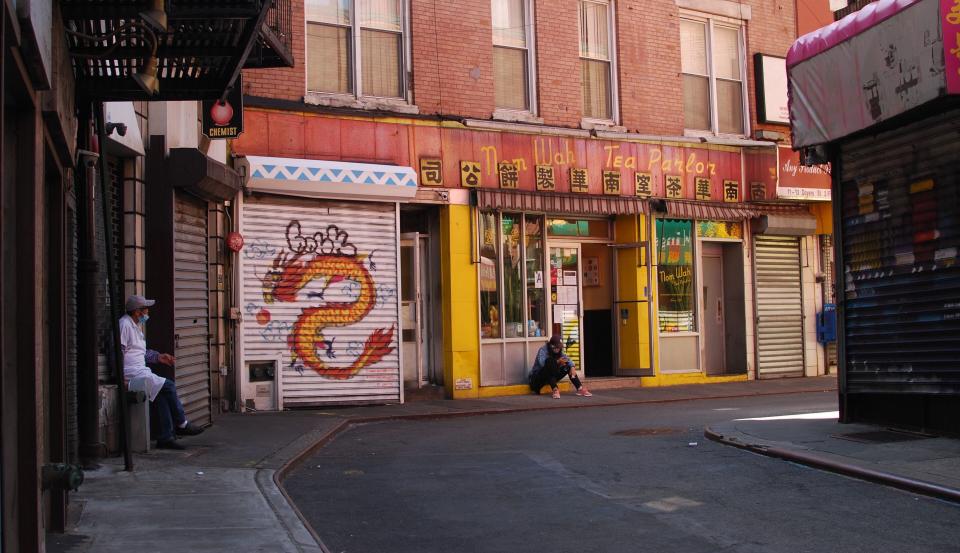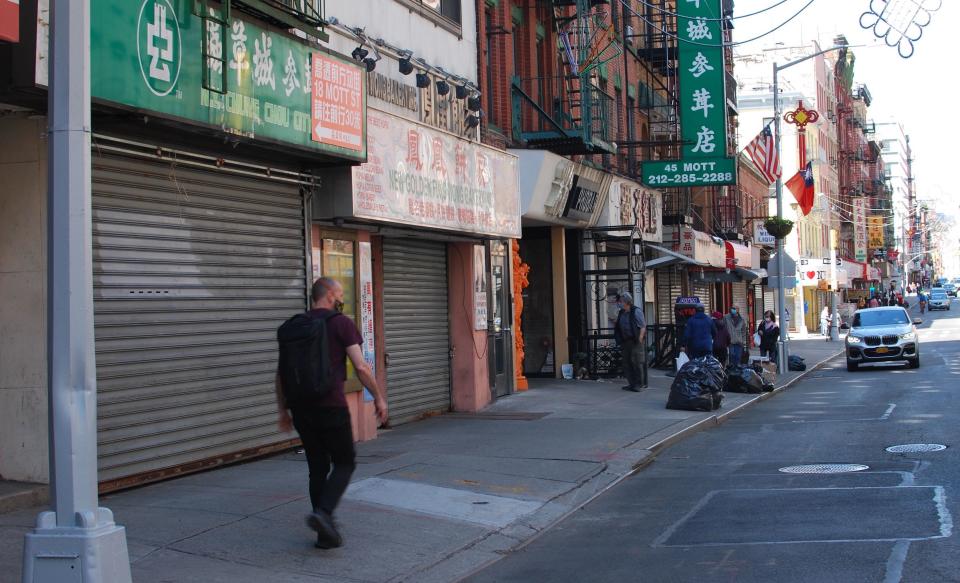Hopes for a quick recovery fade in NYC's Chinatown
The road to recovery for New York City’s Chinatown looks fraught with challenges: restaurants at half-occupancy, landlords attempting to collect on months of deferred rent, banks increasing loan-loss provisions. Add in worries over xenophobia and foreclosures, and a picture starts to form over how uphill a battle the community faces.
On Doyers Street, Wilson Tang closed the 100-year old Nom Wah Tea Parlor on the week of March 15.
Tang secured a Paycheck Protection Program loan to keep his employees paid at all three of his restaurant locations. When Tang talked of re-opening the business for takeout and delivery, his workers balked. Many live in the outer boroughs of NYC, and in addition to fears of contracting the virus on the subway, they were also petrified over accounts of Asian-Americans harassed and assaulted while taking public transit.
“There was a lot of fear. And with all the sinophobia and xenophobia, the idea was to not go in. And I followed what the staff wanted to do,” Tang said.
Nom Wah, along with several other restaurants, re-opened for takeout and delivery on the week of May 17 to at least open the spigot for some revenue.
Re-opening is only half the battle. Jan Lee, a landlord who also runs the community group Neighbors United Below Canal, worries that if people don’t come back to Chinatown to eat or shop, 50% of businesses may disappear - for good.
“There may not be a Chinatown,” Lee said.

The dessert shop and the barber
Michael Tan crunched the numbers for his dessert shop Eggloo on Mulberry Street.
“It would cost us more to re-open than it would to stay closed at the moment,” Tan said, adding that supply chain disruptions were preventing him from getting the ingredients he needs anyway.
Tan, looking for some revenue stream, hopes to soon sell a waffle maker and waffle powder mix for homemade Hong Kong-style egg waffles just like Eggloo sells.
In the meantime, Tan is leaning on an Economic Injury Disaster Loan from the Small Business Administration and whatever cash flow comes from the $25 gift cards sold on the Eggloo website for $20.
Down the block from Nom Wah, Karho Leung’s barbershop and event space 12 Pell is at a crossroads. With rent piling up and an inability to cut hair with the shelter-in-place still ongoing, Leung says closing for good is “under serious consideration.” Taking a PPP loan or EIDL can only do so much with missed rent payments piling up.
“Let’s say I take the loan,” Leung said. “I still don’t have a date I can open yet.”
The landlord
Collecting rent remains the central problem in Chinatown, underscored by a New York Fed survey highlighting a higher likelihood among Asian-owned businesses to defer expenses or payments if faced with a two-month revenue loss.
The study, done just before the COVID-19 crisis, noted that 29% of all small businesses would be forced into skipping a payment, compared to 37% of Asian-owned small businesses.

Jan Lee collected rent from just one of his three tenants (two restaurants and a cosmetics store) in April and collected nothing for May. But New York City has not postponed its next property tax collection date on July 1, raising worries that failure to pay will force landlords across the city into foreclosure. Property taxes remain the last pillar standing for state and local governments which, with little sales or income to collect tax on, are facing massive budget shortfalls of their own.
“The only solution that’s going to help this: move the tax deadline back. Waive late payment fees,” said Lee.
Lee said foreclosures among Chinatown landlords could result in tenement buildings falling into the hands of commercial property developers.
The banker
Abacus Federal Savings Bank is a community bank with $346 million in total assets and a main branch serving Chinatown on Bowery. Abacus CEO Jill Sung shares Lee’s concerns over foreclosures.
“Businesses are going to have a hard time reopening in Chinatown,” Sung said. “That makes us really, really nervous. I actually think the city would prefer that because they want the real estate.”
One way to prevent the buildings from changing hands is to keep its tenants whole, re-centering Chinatown’s liquidity crisis on its small businesses. Although the bank had issues accessing the SBA’s E-Tran system during the first round of PPP loans, Abacus had underwritten about 75 PPP loans worth a total $2.3 million as of May 20.

In the absence of PPP loans, Chinatown businesses were likely dipping into their personal coffers. The same New York Fed survey noted that 26% of Asian-owned small businesses rely on personal savings as a primary source of funding, compared to 14% of all small businesses.
Sung says Abacus is in the process of modeling out whether or not it should expect higher loan losses with its portfolio of mostly consumer mortgages. Although confident about the bank’s liquidity position, Sung said the second quarter faces enormous uncertainty from a loan loss provisioning standpoint.
“I don’t think it’s going to be pretty,” Sung said.
Road ahead
The Chinatown Partnership says of the over 290 restaurants in the neighborhood, about 80 were open as of last week. At the peak of the crisis, as few as 39 were open.
Wellington Chen, who runs the nonprofit, is calling for the city to close streets to allow for outdoor dining once dine-in is permitted again. Last week the city closed Doyers Street and Nom Wah is now exploring how it can accommodate outdoor seating. Tang said the business, like many others, will be in survival mode.
“The goal is not to make money. The goal is to just maintain and see what the new normal will be,” Tang said.
Despite the depth of the COVID-19 crisis, Chinatown’s business owners have hope in history. Chinatown survived 9/11 and endured the crippling damage from Hurricane Sandy.
“Asian entrepreneurs are extremely hard-working and extremely resilient,” Chen said.
Brian Cheung is a reporter covering the Fed, economics, and banking for Yahoo Finance. You can follow him on Twitter @bcheungz.
Fed officials warn of long road ahead for U.S. economic recovery
Congress tells Fed to hurry up on cheap loan program for Main Street
Powell: Federal Reserve not out of ammunition 'by a long shot'
Fed flags corporate leverage as financial system weathers COVID-19
A glossary of the Federal Reserve's full arsenal of 'bazookas'
Read the latest financial and business news from Yahoo Finance
Follow Yahoo Finance on Twitter, Facebook, Instagram, Flipboard, SmartNews, LinkedIn, YouTube, and reddit.

 money
money 
